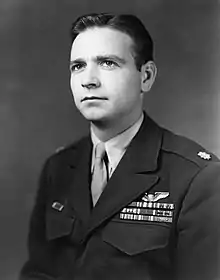Henry William Brown
Henry William Brown (January 25, 1923 – February 19, 2008) was a United States Army Air Force fighter ace who was credited with shooting down fourteen aircraft and destroying another fourteen on the ground during World War II.[1][2] He retired from the Air Force as a colonel in 1974.[3] [4] He was the highest scoring ace of the 355th Fighter Group.
Henry William Brown | |
|---|---|
 Henry W. Brown | |
| Nickname(s) | "Baby" |
| Born | January 25, 1923 Dallas, Texas, U.S. |
| Died | February 19, 2008 (aged 85) Sumter, South Carolina, U.S. |
| Allegiance | |
| Service/ | |
| Years of service | 1942–1974 |
| Rank | |
| Unit | 355th Fighter Group |
| Commands held | 48th Tactical Fighter Wing |
| Battles/wars | World War II Vietnam War |
| Awards | Distinguished Service Cross Silver Star Legion of Merit Distinguished Flying Cross (5) Purple Heart Air Medal (19) |
Early life
Brown was born on January 25, 1923 in Dallas, Texas.
World War II
Brown joined the reserves in December 1941 and attended flight school at Spence Field in Georgia, graduating as a flight officer in March 1943.[2] He was assigned to the 354th Fighter Squadron of the 355th Fighter Group of the Eighth Air Force at RAF Steeple Morden in November 1943.
Brown scored his first four ground kills, while flying the P-47 Thunderbolt, before transitioning to the P-51 Mustang. He was assigned to three different aircraft during his time with the 355th FG, in which his P-47 was named 'Baby' and his P-51B and D were named 'The Hun Hunter Texas'. All of which bore the fuselage identification codes WR: Z.
On March 8, 1944 following a Berlin mission escort, Brown destroyed three Ju 88 and a shared Bf 110, while strafing Hosepe Airfield to become the first Eighth Air Force fighter pilot to destroy more than 3 in one day.
He became the 355 FG's fifth flying ace on April 24, 1944 and led the 355th FG in total air/ground scores on May 13 at the start of the Eighth Air Force campaign against German oil industry.
When Brown returned from stateside leave in late August he was promoted to Captain in September and went on a 30-day rampage, destroying 8 on the ground and 7 in the air to become the Eighth Air Force (active) leading top scorer. He was the first Eighth Air Force pilot to destroy 6 on the ground, during September.
On October 3, 1944 Brown was shot by German flak at Nordlingen Aerodrome. Major Charles Lenfest, CO of 354th Fighter Squadron[5] landed in an attempt to rescue Brown, but became stuck in the wet ground and both were captured. Brown was a Prisoner of War until the end of the war, while Lenfest successfully escaped in April, 1945.
Brown remained 355th FG top ace and top scorer. His final score was 14.2 destroyed and 3 damaged in the air, 14.5 destroyed and 10 damaged on the ground.
Cold War era
Brown remained in the Air Force after the war.[2] Brown obtained degree at University of Omaha in 1960.
He headed the F-111 Aardvark program at Nellis Air Force Base. He later commanded the 48th Tactical Fighter Wing and was the deputy Director of Operations for the Seventh Air Force during the Vietnam War, flying combat missions.
He retired from the Air Force in 1974.
Later life
Brown died on February 19, 2008 at Sumter, South Carolina.
Awards and Decorations
His awards include:
 |
US Air Force Command Pilot Badge |
| Distinguished Service Cross | |
| Silver Star | |
| Legion of Merit | |
| Distinguished Flying Cross with four bronze oak leaf clusters | |
| Purple Heart | |
| Air Medal with three silver and one bronze oak leaf clusters | |
| Air Medal with bronze oak leaf cluster (second ribbon required for accouterment spacing) | |
| Air Force Commendation Medal | |
| Army Commendation Medal | |
| Air Force Presidential Unit Citation | |
| Army Good Conduct Medal | |
| Air Force Outstanding Unit Award | |
| Prisoner of War Medal | |
| Combat Readiness Medal | |
| American Campaign Medal | |
| European-African-Middle Eastern Campaign Medal with four bronze campaign stars | |
| World War II Victory Medal | |
| National Defense Service Medal with bronze service star | |
| Vietnam Service Medal with bronze campaign star | |
| Air Force Longevity Service Award with silver and two bronze oak leaf clusters | |
| Small Arms Expert Marksmanship Ribbon | |
| Croix de Guerre, with Palm (Belgium) | |
| Vietnam Gallantry Cross Unit Award | |
| Vietnam Campaign Medal |
References
- Jerry Scutts (20 November 2012). Mustang Aces of the Eighth Air Force. Bloomsbury Publishing. ISBN 978-1-78200-675-6.
- Bill Marshall (1984). Angels, bulldogs & dragons. Champlin Fighter Museum. ISBN 978-0-912173-02-3.
- Eric Hammel (22 January 2010). Aces in Combat: The American Aces Speak. Pacifica Military History. pp. 161–. ISBN 978-1-890988-08-1.
- Arthur Wyllie (6 April 2009). Army Air Force Victories. Lulu.com. pp. 254–. ISBN 978-0-615-15549-4.
- "Brigadier General Charles W. Lenfest". United States Air Force. Retrieved 2018-06-13.
External links
- "Henry William Brown". American Air Museum in Britain. Imperial War Museum. Retrieved 2018-06-12.